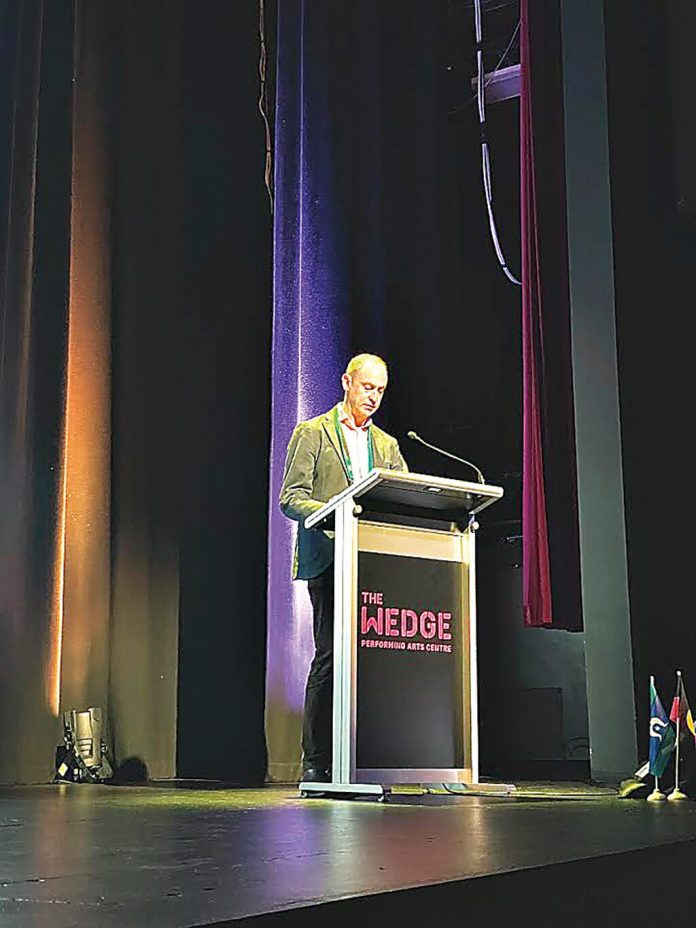
ZAIDA GLIBANOVIC
By ZAIDA GLIBANOVIC
THE re-established State Electricity Commission (SEC) will definitely have an office in Morwell. The interim chief executive of the SEC, Chris Miller, confirmed the establishment of the office in an interview with the Express at the Gippsland New Energy Conference in Sale. Mr Miller said the SEC’s Morwell office would go ahead once SEC operational planning was finalised. “We are conscious of the expectations in Morwell and Gippsland that we have a presence here – what I want to do is get that strategy right and then work out exactly what our regional footprint looks like. In the meantime, we’ve secured some space at the Victorian government hub (in Morwell),” Mr Miller said. Having already sent staff to begin work in the government hub and in Gippsland, the SEC maintains it is committed to a presence in the region. Talking to the Express, Mr Miller confirmed that the SEC was “in the market, looking for people based in Morwell to work from Morwell – at this stage, a small number”. Despite confirming its Morwell presence, the SEC has yet to confirm details about its operation and establishment. “We’re still going through a pretty important design and re-establishment phases for the SEC,” Mr Miller said. The state government made a promise to resurrect the SEC so that it may compete in the commercial energy market and provide publicly owned substitutes for ageing fossil fuel electrical infrastructure. “We’re working up a strategy for the organisation, and we really want to get that strategy right before we design our detailed footprint,” Mr Miller said. “What we’re trying to do is make sure the form of the organisation really follows the function of the organisation.” The SEC has had a rocky start, with the resignation of the former chief scientist and SEC adviser, Dr Alan Finkel. It was reported by the Financial Review that Dr Finkel’s resignation from his advising role at the SEC came as the organisation received wide spread criticism from energy experts that the SEC had no real plan. The state government committed an initial $1 billion in the May budget to help deliver 4.5 gigawatts of power through renewable energy projects, with the Victorian government to take a majority stake in the projects. Mr. Miller maintained the SEC’s planning stage was “well-progressed” in the timeline to full-scale operation, but could not confirm any set dates of operations. When it comes to local job opportunities, the SEC ‘Mark 2’ will not be the same employer it once was for the region. “I’ve got a team who is largely based in Melbourne at the moment, and they’re working with me on the design and implementation phase,” Mr Miller said. It was confirmed earlier this year after extensive questioning from the Gippsland South Nationals MP, Danny O’Brien, during the Public Accounts and Estimates Committee that $44.5 million in funding over two years has been allocated to prepare the SEC for its new role, including setting up a presence in Morwell and Melbourne. The funding will cover various costs, including staffing, securing accommodation and retention of experts; however, there is no specific funding allocation to Morwell. The SEC Implementation Office has already secured space in Morwell and is currently in the process of hiring staff who will be located there. All SEC roles are advertised as being able to be based in Morwell or Melbourne. The SEC’s footprint will ultimately be informed by the organisational strategy and the SEC’s investment portfolio, both of which are currently under development. In his speech at the New Energy Conference, Mr. Miller touched on his inspiration for the old SEC. Formed in 1921, the SEC was made to transition Victoria into a brown coal power generation state and reduce its reliance on black coal imports for more reliable and affordable energy. Described as an innovative driving force of Australia’s energy market, the SEC aims once again to become just that by bringing together the private and public sectors and accelerating renewables. Victoria’s goal to achieve at least 95 per cent of the grid renewable energy by 2035 is an ambitious one that the SEC recognises needs to be accelerated to achieve those goals. During Q and A time, Mr Miller was asked how the SEC could stay a company invested in energy but also a government entity and ensure no disadvantage to the private sector. Mr Miller said that they’d work at an arm’s length of the government. The Financial Review reported when the SEC was announced that there was a chance that with so many big corporations applying for feasibility licenses in offshore wind in Gippsland, having the state government as competition may deter investors. Ms Miller addressed some of these concerns, saying he was confident the public and private sectors could work together to achieve better outcomes for the energy economy. The SEC has yet to find its first project, with many corporations ahead in the renewable investment game and market operator warnings that the transition is going too slowly.










